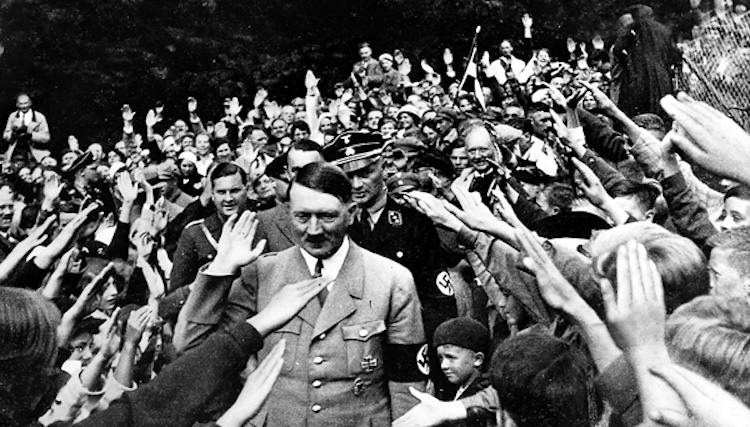Doubts about the origins of World War II, on the 80th anniversary of D-Day

By Jonathan Power*
LUND, Sweden | July 9, 2024 (IDN) — It is a common trait of humanity that we show a generosity of interpretation toward ourselves that we do not tolerate toward others. We find proof of our wickedness using evidence that we would not use against ourselves. We trivialize our own sins, those of our own country and our leaders, past and present.
During the Nazi regime in Germany, the Allies tended to distort Hitler’s activities in their reports, for example by pinning on him the fact that he had begun the indiscriminate bombing of civilians in the first days of the war. In fact, however, it was British strategy that started it, as some of the more honest among them later boasted.
The true events are available to anyone who wishes to study them impartially. In a sober study entitled “Germany’s Economic Preparations for War,” published in 1959 by Burton H. Klein, an economist at the Rand Corporation, which is effectively the Pentagon’s research department, there is a truthful account of the bombing and rearmament policies of both sides.
During the war, Klein served on the United States Strategic Bombing Survey. He later served on the President’s Council of Economic Advisors and as Special Assistant to the Secretary of Defense. He concluded that German rearmament was largely a myth until the spring of 1936.
But according to Churchill, two independent estimates put German rearmament spending in 1936 at 12 billion marks per year. The actual amount was less than 5 billion.
Why was that? Because Hitler was more interested in increasing his popularity at home at the time and therefore gave priority to domestic spending. Göring, the commander-in-chief of the Luftwaffe, had announced: “guns before butter”. In fact, Hitler put butter before guns.
In his first years in power, Hitler ruled, some would say, with a light hand. To put the “coercion” debate in perspective, the post-war communist state of East Germany employed 190,000 official surveillance experts and an equal number of “unofficial collaborators” to monitor a population of 17 million people. By comparison, the Gestapo, the German secret police, had just over 7,000 employees to monitor a population of 60 million people.
Hitler implemented Keynes’ ideas
Hitler ended the Great Depression in Germany, which had been a major factor in his rise to power, not through rearmament or war, but by implementing the economic ideas of the great British economist of the 1930s and ’40s, John Maynard Keynes – by pumping money into the economy, by investing enormous sums in infrastructure and thus in job creation. To implement these policies, he ignored the advice of his finance minister and other economic advisers. Germany pulled itself out of recession.
Hitler made cars affordable for the average German. His government introduced the then-unknown concept of annual leave. It doubled the number of days off for workers and began to develop tourism within Germany on a large scale.
His regime built hospitals and gave preference to families over singles and childless couples. It insured farmers against the vagaries of the weather and the world market. It introduced a progressive income tax, child benefits and kindergartens, and worked hard to end the poverty that many pensioners faced.
Rent control and tenants’ rights were strengthened. Debtors received increased protection against wage garnishment. Creditors were prohibited from processing the property of conscripts. This was socialism in National Socialism, the name of his party. Himmler, the architect of the Holocaust, spoke of “socialism for the good,” that is, without the Jews, homosexuals and gypsies who were later murdered. in moderation in the concentration camps.
When war finally broke out, the Nazi state, which fought the most expensive war in history, ensured that the majority of Germans bore virtually no costs. The occupied countries had to pay high tributes to Germany. Billions of Reichsmarks were taken from the Jews. Soldiers were recruited from southern Europe. The well-functioning civil service helped Hitler to implement his extremely popular domestic policy and provided the necessary services.
This created a lasting sense of “community” that linked the masses to their leader. This was what encouraged the population to support the war and ignore the Jewish families who were disappearing from the streets, schools, universities and orchestras before their eyes.
Germany did not enter the war because it was ruled by a monster, as is almost universally believed today. He only gradually became a monster. Only after three years in office did he begin to build a massive war machine. It was not until 1941 that he ordered the extermination of Jews, homosexuals and gypsies.
The historical truth
I am not writing this to exonerate Hitler, but only to present the historical truth. Hitler had his goals: he wanted to seize German-speaking countries for himself, if necessary, through a series of small wars and to make Germany a major power like Great Britain, France and the USA.
In his groundbreaking book The Origins of the Second World War, the influential historian AJP Taylor reckoned that “Hitler hoped to get by without war altogether. The only thing he had not planned for was World War II.” Before the war began, he believed war with Britain was avoidable and never seriously considered invading Russia.
As we now know, Churchill avoided many facts and was an expert at twisting reports about events in Germany to suit his own views. For example, he believed that Hitler had been prepared for war since at least the day he became Chancellor.
Had Hitler been better assessed earlier, the Allies might have found a way to avoid war and forestall the massacre of the Jews. The problem was that the debate, particularly in Britain, was dominated by Churchill and his views on the necessity of war. The British people came to believe that he was right and that any contrary opinion, whether it came from within or without, was treasonous.
*Jonathan Power was a foreign affairs columnist for the International Herald Tribune for 17 years.
Note: This is the first of two columns on the origins of World War II. The future column, revealing Poland’s insidious and decisive role in its outbreak, is still being researched. (IDN-InDepthNews)
Copyright: Jonathan Power
Visit: www.jonathanpowerjournalist.com
Photo source: Guided History




